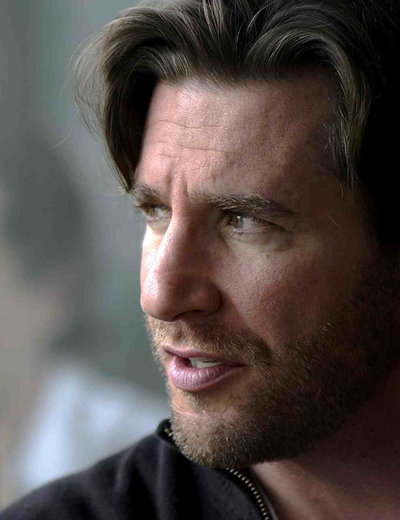Thriller writer Barry Eisler has turned his back on traditional publishing — or as he calls it, legacy publishing. His latest book, The Detachment, was released as an e-book in September. It comes out in paperback in October. Both versions are published by Amazon.
No longer satisfied with just selling books, the online retailer now has its own publishing arm, which is starting to attract some successful writers like Eisler. The best-selling author shook up the publishing world last March when he walked away from a two-book, half-million-dollar deal with St. Martin’s Press. Instead, Eisler announced, he would self-publish his next book electronically.
“Amazon read about it and approached me with what is essentially a hybrid deal, the best of both worlds,” Eisler tells NPR’s Lynn Neary. Eisler retained control over packaging and business decisions that were important to him. The digital title was released about a month after the manuscript was finished. And he was thankful to have “the entire Amazon marketing juggernaut behind the book” — something an author misses out on when self-publishing. “Amazon offered me the best of both worlds, and it really worked out well,” he says.
It works for Amazon, too. The company uses popular books to attract customers to buy not only its e-reader — the Kindle and now its tablet device, the Fire — but other products as well. That isn’t an option for traditional publishers, whose interests lie deeply and exclusively in books. But Eisler says that like any company, publishers exist to make money.
“To say that publishers really care passionately about books as though they are concerned about what’s better for the world … I’m sure when they look in the mirror they feel that way. … We all do,” he says. “But in fact, what they care about is preserving their own position, perks and profit — that’s just what establishment players come to do over time.”
At the end of the day, what matters to Eisler is how easily and how cheaply he can get his writing into the hands of his readers. “What I care about is readers,” he says, “because without readers I can’t make a living. … And I think it’s a bad thing for the world if people don’t read anymore. I want people to read a lot. To that end, if I can find a way to get readers books that cost less and are delivered better and faster, I want that.”
And as far as he can tell from his experience with the e-release of The Detachment, it’s working: “Sales of The Detachment have blown away sales of any of my previous titles,” Eisler says.
But not everyone is celebrating his success. His decision to self-publish, he says, was initially greeted with a lot of enthusiasm and excitement from people advocating for changes in the publishing industry. A best-selling author walking away from a big advance from a legacy publisher was a milestone for the self-publishing world.
“But then, when I signed with Amazon, those ’attaboys’ turned to cries of ’Hypocrisy!’ and ’Eisler is a sellout!’ and that sort of thing,” Eisler says.
But Eisler stands by his decision to sign on with the distribution giant. “My objectives were to make more money from the title to get the digital out first, and to retain more control over business decisions,” he says. Self-publishing was a good way to achieve those goals, but Amazon’s deal was a better way.
“If a better way comes along … of course I’m going to take it,” he says. “Publishing for me is a business, not an ideology.” [Copyright 2011 National Public Radio]
To learn more about the NPR iPad app, go to http://ipad.npr.org/recommendnprforipad
See online: Barry Eisler’s ’Detachment’ From ’Legacy’ Publishing

